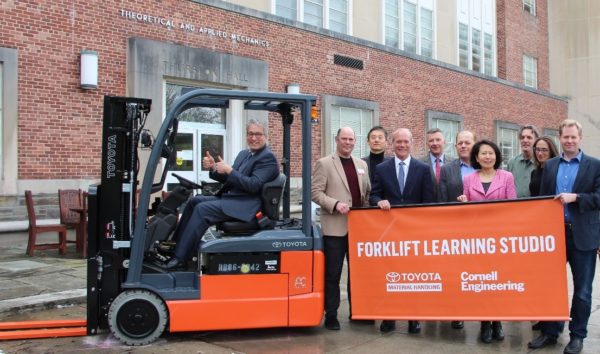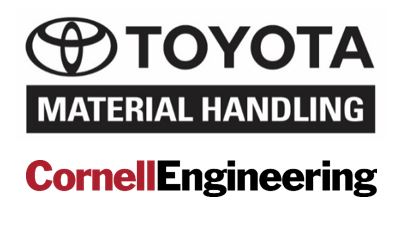The partnership aims to fundamentally change the learning experience by connecting theory and application
Toyota Material Handling (TMH) and Cornell University’s College of Engineering have announced a unique partnership dedicated to the development of an innovative learning studio that incorporates Toyota equipment to elevate immersive engineering education to an entirely new level.
The Forklift Learning Studio will be built and developed during the summer with the goal of officially launching it to Cornell engineering students at the start of the fall semester in August.
Toyota and faculty from Cornell Engineering’s Sibley School of Mechanical and Aerospace Engineering (MAE) began discussing this partnership late last year as a way to revolutionize the way engineering students learn by finding a more optimal balance between lecture and lab sessions.

“Our students enjoy theory, but they are motivated by action–building, and testing. They respond best to seeing engineering systems first and having the system motivate the theory they learn,” said David Erickson, the S.C. Thomas Sze Director of MAE. “The educational opportunity Toyota is enabling us to bring to life will fundamentally change the student experience by allowing them to see how each area of engineering connects to a larger system – in this case, a forklift. We believe this will provide students a uniquely engaging learning environment.”
Erickson intends for this to be the first of multiple learning studios. Each one will be designed to unify multiple courses and link students across classes and skill levels as they engage in work with real-world applications. They will each incorporate a fully functional system – like a forklift – so that students can use it to perform experiments and model problems that connect to lessons from other classes. This set of lab redesigns is supported by an Innovative Teaching and Learning Award from Cornell’s Active Learning Initiative.

“We are excited about the future of this partnership and the impact it will have on the next generation of engineers,” said Brett Wood, President & CEO of Toyota Material Handling North America and a Cornell graduate. “As a former engineering student, I would have loved the opportunity to learn in such a hands-on way that connects the classroom to the real world. Young people often wonder how they’ll use certain theories in their professional lives because it’s often difficult to connect the dots. In our Forklift Learning Studio, all of the ‘dots’ will exist in the same space as the finished product. This connects perfectly to our Toyota culture of continuous improvement by giving Cornell Engineering students a place for continuous learning.”
Toyota proposed that forklifts would be a perfect fit for such a learning studio and offered to donate the equipment and branding work necessary to bring the idea to life. Forklifts encompass all aspects of a mechanical engineering curriculum – they use internal combustion engines (thermofluids), bear weight (structural mechanics), and their use depends on dynamic stability (dynamics and controls).
This innovative learning space will provide students with opportunities to discover new principles and to build bridges – both between their courses and from their coursework to their careers. For the college, this model provides efficient and effective use of space that allows engaging lab work to be spread evenly through the curriculum.
“Systems thinking is at the core of what we teach students. The ability to take apart a complex system – and to analyze its key components and their interconnections – is essential to modern engineering,” said Lynden Archer, the Joseph Silbert Dean of Engineering at Cornell. “This learning studio will advance our educational priorities and enrich the MAE experience for all students. I anticipate that the model we’ve formed with Toyota will be replicated in programs that span the entire college. We deeply appreciate the expertise and forward-thinking approach that Brett and his colleagues at Toyota have brought to the table as we reimagine engineering education and strengthen our connections to important industries.”
In addition to modernizing the way students learn, the mutually beneficial partnership will expose them to new products and industries where they could build successful careers. The forklift industry is an essential part of the nation’s supply chain, and it is coming off a record year in 2021 with 334,000 units sold in North America. The industry contributes more than $26 billion to the United States’ annual GDP and offers wide-ranging opportunities for engineers – including in automation.
“When you think about it, forklifts are incredibly important to the world we live in. Everything that we buy at the grocery store, every package that ends up at our front door was touched by material handling equipment at some point in the process,” said Brian Kirby, the Meinig Family Professor of Engineering at Cornell’s MAE. “If we can’t move goods and materials, it has a domino effect on all kinds of things in the industry, the economy, and ultimately our society. The opportunity to expose our students to such an important industry while also revolutionizing the way they learn is a win-win on every level.”











